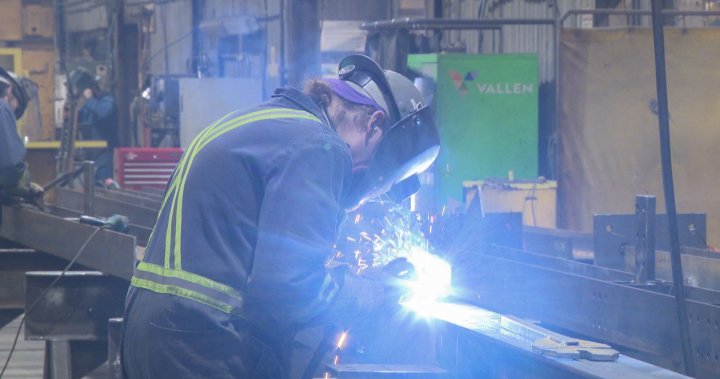Canada
Sask. NDP leader calls for homegrown solutions to Trump’s steel tariffs

The Importance of Saskatchewan’s Steel Industry in the Face of U.S. Tariffs
Saskatchewan’s steel industry is at a critical juncture as it grapples with the implications of U.S. President Donald Trump’s planned tariffs on Canadian steel and aluminum. The province, known for its rich natural resources and manufacturing capabilities, has long relied on cross-border trade to sustain its economy. However, the looming tariffs have sent shockwaves through the industry, prompting calls for a renewed focus on homegrown products and domestic job creation. Saskatchewan’s Official Opposition, led by the NDP, has been vocal in advocating for a stronger emphasis on local production and the development of trade infrastructure to mitigate the impact of these tariffs.
At the heart of this call to action is the recognition that Saskatchewan’s steel industry is not just a source of employment but a cornerstone of the province’s economy. The industry supports thousands of jobs, from manufacturing and production to logistics and innovation. As global trade dynamics continue to shift, the need for a robust and resilient domestic industry has never been more urgent. Leaders like Carla Beck, the Saskatchewan NDP Leader, are urging the government to prioritize initiatives that bolster local manufacturing and reduce reliance on uncertain international markets.
The NDP’s Call to Action: Diversifying Trade and Supporting Local Innovation
Carla Beck, speaking at a news conference held at Supreme Steel in Corman Park, north of Saskatoon, emphasized the need for a multifaceted approach to address the challenges posed by the U.S. tariffs. “We need to double down on trade infrastructure, on finding new markets, on increasing what we make here at home, on supporting Canadian innovation,” Beck stated. Her message highlights the importance of diversification and self-sufficiency in the face of external pressures. By investing in local production and innovation, Saskatchewan can not only weather the storm of tariffs but also build a stronger, more sustainable economy for the future.
Beck’s remarks underscore the importance of leveraging Saskatchewan’s unique strengths, such as its abundant natural resources and skilled workforce, to create a competitive advantage. The NDP is advocating for policies that encourage the development of new markets for Saskatchewan-made products, both within Canada and internationally. This strategy not only helps to reduce the province’s vulnerability to U.S. trade policies but also creates opportunities for growth and innovation. By focusing on homegrown products, Saskatchewan can position itself as a leader in the steel industry, known for quality and reliability.
The Role of Supreme Steel and the Shift to Domestic Focus
David Fritz, president of Supreme Steel, echoed the NDP’s call for a renewed focus on domestic production and stability. Fritz emphasized the importance of adapting quickly to the changing trade landscape, stating, “We don’t have time to sit and wait as things keep changing day to day. We’re making plans to make sure that we’re keeping our workforce busy with work that is stable and reliable.” Supreme Steel, a key player in Saskatchewan’s manufacturing sector, is emblematic of the province’s industrial capabilities and its potential for growth.
Fritz’s remarks highlight the practical steps being taken by businesses in response to the tariffs. By shifting focus to domestic markets and ensuring a stable workload, companies like Supreme Steel are not only safeguarding jobs but also laying the groundwork for long-term success. This proactive approach is essential in a sector where uncertainty and fluctuating demand can have significant impacts on operations and employment. The emphasis on stability and reliability reflects a broader understanding of the need for resilience in the face of external challenges.
The Broader Impact on Saskatchewan’s Economy and Communities
The steel industry’s challenges and opportunities extend far beyond the factory floor. The sector’s health has a ripple effect on communities across Saskatchewan, impacting everything from local businesses to family incomes. As the NDP and industry leaders like David Fritz advocate for a stronger focus on local production and domestic markets, they are also championing the interests of Saskatchewan’s workers and families. Jobs in the steel industry are not just a source of income; they are a source of pride and a foundation for community prosperity.
The push for homegrown products and job creation in the steel industry also aligns with a broader vision for Saskatchewan’s economic future. By prioritizing local manufacturing and innovation, the province can reduce its reliance on external factors and build a more self-sufficient economy. This approach not only addresses the immediate challenges posed by U.S. tariffs but also positions Saskatchewan for long-term growth and competitiveness. As the industry evolves, the focus on domestic production and stability will play a crucial role in ensuring that Saskatchewan’s communities continue to thrive.
The Path Forward: Building a Resilient and Sustainable Economy
In the face of U.S. tariffs and shifting trade dynamics, Saskatchewan’s steel industry is at a turning point. The calls for a greater focus on homegrown products and domestic job creation reflect a shared recognition of the need for a stronger, more resilient economy. Leaders like Carla Beck and David Fritz are helping to chart a path forward, one that prioritizes local innovation, stable employment, and sustainable growth.
As Saskatchewan navigates this uncertain landscape, the emphasis on trade infrastructure, market diversification, and domestic production will be key. By supporting Canadian innovation and fostering a culture of self-reliance, the province can position itself as a leader in the steel industry and beyond. The road ahead will require collaboration between government, businesses, and communities, but the potential rewards are significant. A stronger, more sustainable economy is not just a goal—it’s a necessity. And with the right strategies in place, Saskatchewan is poised to rise to the challenge.